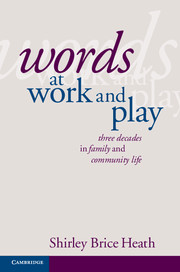Book contents
- Frontmatter
- Contents
- Maps, family trees, figures, and tables
- Acknowledgments
- Note on transcriptions
- Epigraph
- Prologue
- 1 On being long in company
- 2 A boy finds his mama(s)
- 3 The closeness of strangers
- 4 Embracing talk
- 5 Lines of vision
- 6 The hand of play
- 7 Ways with time and words
- 8 Shaping the mainstream
- Epilogue
- Appendix A Ethnography as biography and autobiography
- Appendix B On methods of social history and ethnography
- Notes to text
- References
- Index
Appendix A - Ethnography as biography and autobiography
Published online by Cambridge University Press: 05 August 2012
- Frontmatter
- Contents
- Maps, family trees, figures, and tables
- Acknowledgments
- Note on transcriptions
- Epigraph
- Prologue
- 1 On being long in company
- 2 A boy finds his mama(s)
- 3 The closeness of strangers
- 4 Embracing talk
- 5 Lines of vision
- 6 The hand of play
- 7 Ways with time and words
- 8 Shaping the mainstream
- Epilogue
- Appendix A Ethnography as biography and autobiography
- Appendix B On methods of social history and ethnography
- Notes to text
- References
- Index
Summary
The storytelling that thrives for a long time in the milieu of work – the rural, the maritime and the urban – is itself an artisan form of communication, as it were. It does not aim to convey the pure essence of the thing, like information or a report. It sinks the thing into the life of the storyteller, in order to bring it out of him [sic] again. Thus traces of the storyteller cling to the story the way the handprints of the potter cling to the clay vessel.
(Benjamin 1969, p. 91)In the span of decades this book covers, debates about the “authenticity” of genres have frequently appeared in book reviews, editorials, and opinion pieces. Memoirs later discovered to have been doctored with incidents that did not really happen to the writer have been widely discredited by critics while sales figures for these disputed genres have gone up. Autobiographies thinly masked and elaborated as fiction have stimulated speculation regarding the true identities of fictional characters, places, and corporate enterprises. The key question often raised in these debates has surrounded the kind of knowledge a writer has. To what extent has a writer seen and heard or directly experienced what is filtered through the writer’s language to the page or screen?
Anthropology and science
For ethnographers, most especially those who have undertaken long-term fieldwork or near-continuous tracing of families or groups, the nature of social science in the storytelling complicates questions of what was “really” there. In the 1980s, postmodernism, critical theory, hermeneutic philosophy, and narratology challenged objectivity and any claims for the neutrality of science. Postmodernism shook the foundation of notions of objectivity in social science and highlighted the writer’s subjectivity and positionality. Anthropologists looked with intense scrutiny at their own writing, from fieldnotes to final stylized texts, and questioned classical ideas of “distanced normalizing description” (Rosaldo 1993, p. 48). The “interpretive” imperative of social science from entry into the field through final editing of manuscripts slated for publication could no longer be hidden beneath affirmations that the science of anthropology could lay bare distinctions between the “primitive” and the “civilized” according to fixed rules of fieldwork. Reinvention was needed (Hymes 1969).
- Type
- Chapter
- Information
- Words at Work and PlayThree Decades in Family and Community Life, pp. 174 - 184Publisher: Cambridge University PressPrint publication year: 2012



